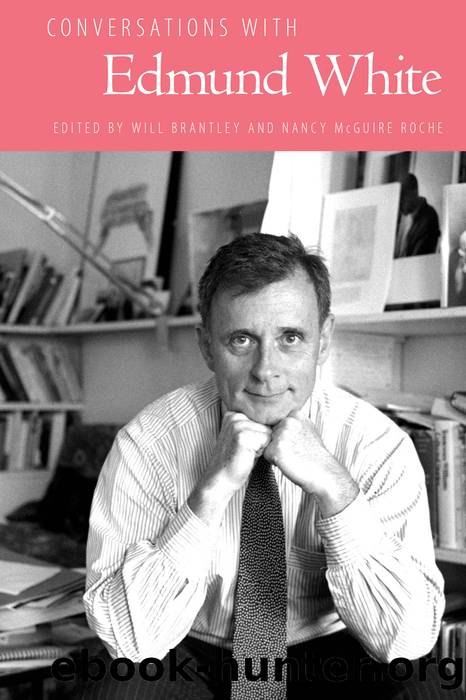Conversations with Edmund White by Conversations & Edmund White

Author:Conversations & Edmund White [ed. Brantley & Roche] (Mississippi, 2017)
Language: eng
Format: epub
Publisher: University Press of Mississippi
Published: 2017-04-15T00:00:00+00:00
Edmund White in Conversation
Mark Ford / 1996
From PN Review 111 (SeptemberâOctober 1996): 22â25. Reprinted by permission.
Mark Ford: Youâve currently got two biographers on your trail. How does that feel?
Edmund White: Well, my nephew is one of my biographers, and heâs doing a fairly traditional biography, with a lot of emphasis on my childhood because he has access to my sisterâwhoâs his motherâand to me, and I think heâs very interested in the family and the family background, so I find heâs rather disappointingly uninterested in my literary careerâbut in any event, heâs only half-way through the book. The other one is Stephen Barber, whoâs doing a book for Picador; heâs English and heâs more interested in the European years, that is since 1983, and in my writing.
MF: Your own fiction often uses the forms and voice of autobiography. Are you worried lest your biographersâ versions of your life clash with autofictionsâto use your own termâsuch as A Boyâs Own Story and The Beautiful Room Is Empty?
EW: I just hope theyâll be as fair with me as I feel I was with Genet. Genet was also somebody who wrote autofiction and he often departed wildly from the facts. In my biography of him I tried to show that he always had an artistic reason for doing so. I think my own main changes have been towards making myself more of a representative or normal kind of person, less of an egghead or weirdo, and less precociously sexual too.
MF: Do you feel autofiction is a particularly American genre?
EW: Yes, certainly the business of the discovery and avowal of the self is ⦠Michel Foucault was a friend of mine, and I often think that if heâd really known my work he would have disapproved, because one of his ideas was of the construction of the self rather than the revelation of the self, and he was in favor of the idea of the self as an artifact rather than the self as an avowal. But on the other hand I think that dual aspect of both creating a new self and discovering an old one are both in my writingâall of which is very peculiar given the fact that I started off as a Buddhist, and not believing in the self at all.
MF: In what ways have your Buddhist beliefs affected your social views?
EW: Well, a lot of the thinking of this last twenty years about social constructionismâor whatever that word isâseemed to me almost overobvious. I couldnât understand what all the fuss was about, because I think that was very much my view from the beginning. And I think already in a book like Forgetting Elena, which came out in 1973, you see that as a totally worked-up view of things.
MF: John Ashbery described the society depicted in Forgetting Elena as âterminally sophisticated.â Would you agree with that?
EW: Sure, I think thatâs such a funny phrase ⦠Forgetting Elena was based on The Pillow Book of Sei ShÅnagonâthe diary of a
Download
This site does not store any files on its server. We only index and link to content provided by other sites. Please contact the content providers to delete copyright contents if any and email us, we'll remove relevant links or contents immediately.
| Diaries & Journals | Essays |
| Letters | Speeches |
The Rules Do Not Apply by Ariel Levy(4957)
Bluets by Maggie Nelson(4548)
Too Much and Not the Mood by Durga Chew-Bose(4338)
Pre-Suasion: A Revolutionary Way to Influence and Persuade by Robert Cialdini(4224)
The Motorcycle Diaries by Ernesto Che Guevara(4090)
Walking by Henry David Thoreau(3953)
Schaum's Quick Guide to Writing Great Short Stories by Margaret Lucke(3376)
What If This Were Enough? by Heather Havrilesky(3308)
The Daily Stoic by Holiday Ryan & Hanselman Stephen(3304)
The Day I Stopped Drinking Milk by Sudha Murty(3196)
The Social Psychology of Inequality by Unknown(3022)
Why I Write by George Orwell(2945)
Letters From a Stoic by Seneca(2794)
A Short History of Nearly Everything by Bryson Bill(2689)
A Burst of Light by Audre Lorde(2597)
Insomniac City by Bill Hayes(2545)
Feel Free by Zadie Smith(2476)
Upstream by Mary Oliver(2388)
Miami by Joan Didion(2365)
